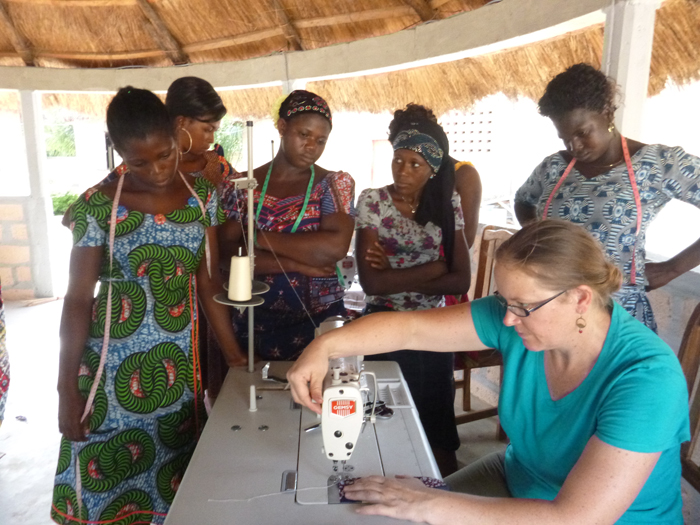Born in rural Idaho and raised in Washington’s Okanogan County, Prairie Rose Hyde came from humble beginnings. “My parents were very ‘back to the land’ types,” Hyde said. “We were very poor. My dad worked for ranchers but we lived on assistance programs.”
 Fortunately Hyde excelled in school and was awarded a scholarship to Whitman College, majoring in biology with a minor in art, focusing on plant biochemistry and ethnobotany. After graduation, Hyde signed on as a sustainable agriculture volunteer with the Peace Corps in the Central African Republic. Here she assisted farmers in growing peanuts, an important protein source, by planting highly producing varieties and nitrogen fixing trees.
Fortunately Hyde excelled in school and was awarded a scholarship to Whitman College, majoring in biology with a minor in art, focusing on plant biochemistry and ethnobotany. After graduation, Hyde signed on as a sustainable agriculture volunteer with the Peace Corps in the Central African Republic. Here she assisted farmers in growing peanuts, an important protein source, by planting highly producing varieties and nitrogen fixing trees.
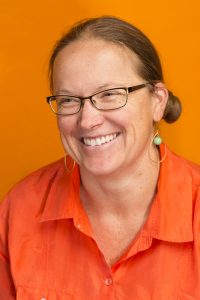
Just as Hyde was making progress with the local community, the country experienced a military uprising and the Peace Corps removed its programs. Hyde was moved to Togo, which felt metropolitan in comparison to the sparsely populated Central African Republic. Here she met Olowo-n’djo Tchala, who would go on to become Hyde’s partner in life, business and philanthropy.
In Togo, Hyde began working with women’s and youth cooperatives on sustainable agricultural practices. “They knew how to grow things,” Hyde said. “What they didn’t have was a way to bring that to the greater market.” Hyde decided to return to school to learn how to help.
After completing her time with the Peace Corps, Hyde enrolled in the University of California Davis where she earned a master’s degree in International Agricultural Development followed by another in Integrated Ecology. When asked why she felt so compelled to help these women, Hyde said, “Even though I grew up very poor, I had all these opportunities given to me. School was free. Getting to school was provided. I learned music and sports at school. I went to a really good college and other people paid for me to go there. I got to study in Germany and Australia. I got to do all these things and it didn’t require me to be affluent. I had all these opportunities given to me because other people cared. If opportunities are given to you, you should pass them on. In Africa I saw what people’s lives are like when people don’t care and opportunities aren’t given.”
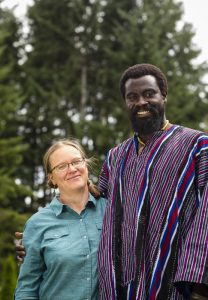
When their first daughter was born in 2002, Hyde and Tchala stumbled across an idea that would enable them to help women in Togo. “A friend of ours gave us a little jar of shea butter that she had gotten at the co-op,” Hyde said. “That’s when we realized that this product that was in stores in California came from West Africa and could be a resource for us to do what we wanted to do.”
The couple decided to start a company importing bulk products harvested, prepared and packaged by the women of Togo. They called it Alaffia, a common greeting meaning peace, health and well-being. Tchala traveled to Togo to set up a women’s cooperative and soon Hyde was receiving shipments and planning sales strategies in addition to an already busy schedule. While Tchala finished his undergraduate degree, Hyde completed her second master’s while expecting their second child. The couple weren’t deterred by the challenge, however. “We’re the kind of people who see what we need to do and put our heads down and do it,” Hyde said.
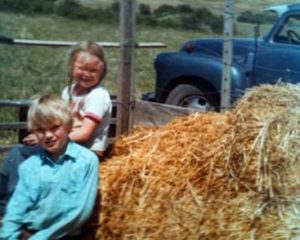
After Tchala‘s graduation, the family relocated to Olympia where they began creating ready to sell products with their imported goods. In 2006, Alaffia products reached the shelves of large natural food store chains. In 2008, the company participated in a nation-wide program with Whole Foods Market and launched their “Everyday Shea” brand.
Today Alaffia employs individuals in Olympia and in Togo as well as purchasing raw materials from thousands more. “The only permanent jobs in Togo before this were government jobs and most of those were only for men,” Hyde said. “Most girls could never have made it through school to get those jobs. Now we’re seeing women empowered by making their own money. When you employ a woman she buys food for the family, a roof for the house, school fees. It’s generational.”
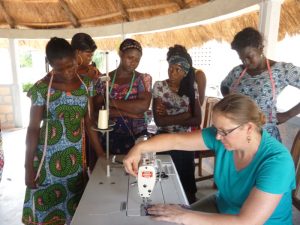
Through Alaffia these women are also bringing aid to their local communities. Their first year in business, Hyde and Tchala started giving back by providing school supplies for their employees in Togo and the company has expanded their philanthropic efforts ever since. Alaffia now focuses their efforts on the areas of health, environment and education. Today, the company products have distributed bicycles, donated eyeglasses, provided school supplies, built school benches, planted thousands of trees and constructed schools, among other things.
Through their Maternal Care Project, Alaffia has funded more than 5,000 births in Togo and saved many lives in the process. “We pay for all prenatal care through the first month post-delivery,” Hyde said. “You can reduce the maternal mortality rate very easily by making sure women get prenatal care and deliver in the clinic. Especially in areas where female genital mutilation is practiced, complications during birth are almost a given. The maternal mortality rate 10 years ago was one in 16. Now with our program it’s two in 1,000. Regionally it has improved to one in 32 due to other programs. It’s crazy how much impact a little can make.”
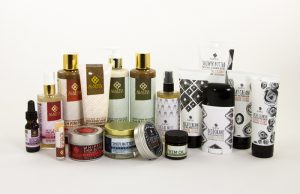
Hyde has run into many obstacles along the way, but her passion for helping the women of Togo keeps her going. “You do things because you know they’re the right thing to do,” Hyde said. “You just put aside the pressures coming from the outside and keep looking at why you’re doing it.”
For more information on Alaffia visit http://alaffia.com. To learn about the many ways that Alaffia is improving lives in Togo visit http://alaffia.com/empowerment/.
Prairie Rose Hyde was recently recognized by the YWCA of Olympia with a 2016 Women of Achievement Award.








































